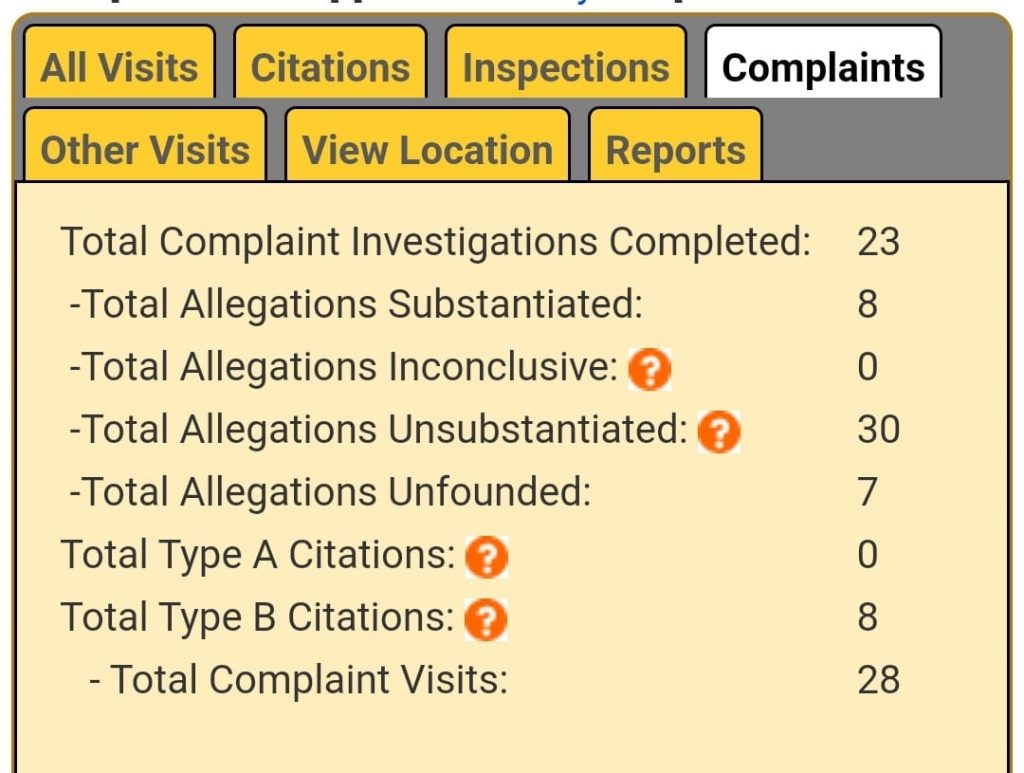Information is power. When it comes to the ones we love, we want to have as much information as possible before making potentially life-changing decisions. This is especially true when moving an older family member into a Senior Care Facility of any type. The state of California maintains a database of every licensed home and any citations they might have against them. We highly encourage prospective residents to research the homes they are considering and what complaints they might have against them. That said, the state website is far from easy to understand, and one can quickly be overwhelmed or frightened by the information. So here are a few tips to better understand the citation reports provided by the state of California.
Definitions

Citation – a civil sanction against a facility in violation of laws or regulations
Deficiency – the violation of laws or regulations that is cited
Complaint – a report made to the state agency that alleges noncompliance of laws or regulations
Substantiated – the complaint or allegation against a facility was verified by evidence
Unsubstantiated (previously Inconclusive) – there was no preponderance of evidence to prove that an alleged violation occurred
Unfounded – the allegation was investigated and determined not to have occurred
Type A vs Type B Citations
Citations recorded by the state of California span a wide spectrum. The issue could be as seemingly small as leaving out a tube of toothpaste when there is a resident with Dementia in the home, or as obviously cruel as letting a resident’s wounds fester without changing the bandages. The state classifies these in the summary by showing how many citations are Type A or B. To learn more about the specific deficiencies, read the Facility Evaluation Reports, which can be found in the Inspections, Other Visits, and All Visits tabs. These provide detailed descriptions about what a Licensed Program Analyst discovered in regards to a complaint or during a routine visit to the facility.
Type A citations pose an immediate risk to health, safety, or personal rights. Examples may include lack of care or supervision, access to open bodies of water, lack of a fire clearance for the building, and access to dangerous chemicals.
Type B citations pose a potential risk to health, safety or personal rights. Examples include faulty medical record keeping and lack of adequate staff training.
Type A citations are usually more serious. They may be as a result of a complaint made by a resident or their concerned family member.
Probation and Revocation of License
If the state has deemed that a facility poses too great of a risk to remain open, they may begin a hearing to revoke the facility’s license. This may result in a revocation, probation, or dismissal, depending on a judge’s decision, which will be noted in the facility’s Status. If a license is suspended, the facility may appeal the decision, but they must remain closed until a judge makes a final decision. If, however, the status is Revocation Action Pending or Probation, the home may remain open during the process. During Probation, a facility is given a period of time to comply with specific terms and conditions.
What to do if You Like a Home That has Citations?
If you’ve toured a home, and you love the environment, the price, and the staff but the California state records show citations that concern you, ask the home about them. Their response may go a long way to reassure you or confirm your doubts. The home may explain how a one-time offense occurred, what they’ve done to rectify the issue, or that they dismissed the offending employee. On the other hand, if they get defensive or refuse to explain, that could indicate deeper problems.
If you’re curious (like we were), the state of California sometimes publishes the most common deficiencies they found in RCFEs over the course of a year. For example, in 2019, the most common issue found was, “Maintenance and Operation: The facility shall be clean, safe, sanitary, and in good repair at all times.” View 2019 Most Common Deficiencies.
Here at Care Placement, all of our Reps and their Assistants are licensed Care Home Administrators. That means we are familiar with state regulations, and we know how the state of California reports its deficiencies. If you have any questions about how to understand the state website, we would love to help. Give us a call at (619) 660-8814.

One thought on “How to Understand California State Citations for RCFEs”